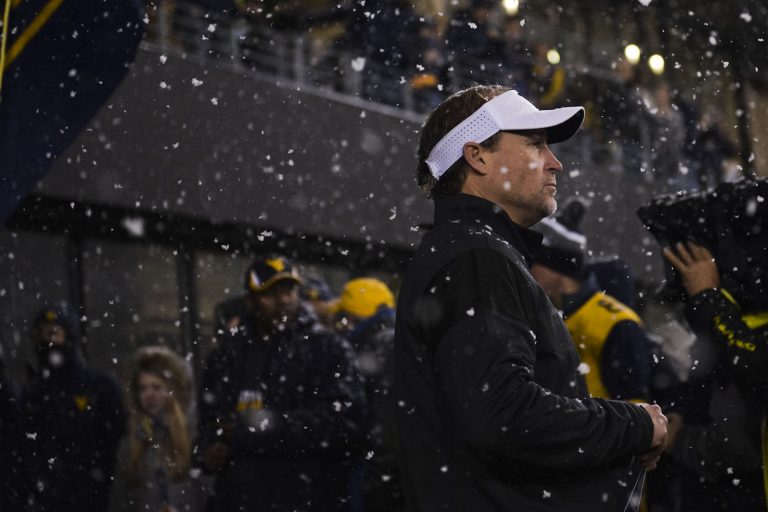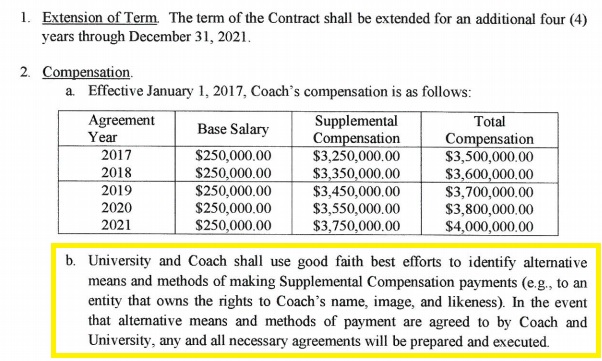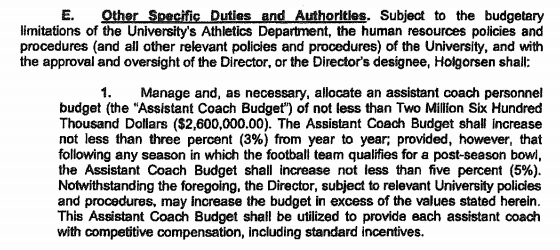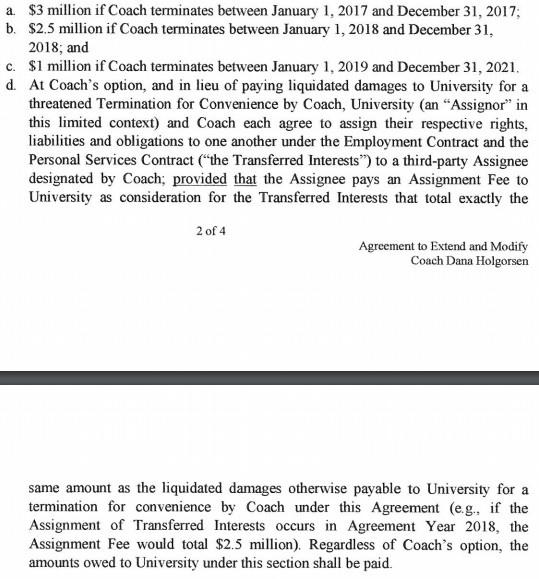Dana has a new deal, with another on the way
December 5, 2016 by Mike Casazza
Let’s spend way too much some time discussing Dana Holgorsen’s new contract before the contract. I’ll explain. It’s what I do.
Here’s the first thing I want you to know, because this is the first thing a lot of people wanted me to know. The first thing you notice about the contract is, in fact, an error.

Dec. 2 was Friday. I wrote in my story that the contract was signed Friday. Nothing wrong with that except that people read what I wrote and People promised me — promised me — the contract was not signed Friday and was actually signed Saturday morning. Is that a big deal? Depends on how much you care about these things and how much you’re willing to care about what goes into negotiations.
What I gather is that this was supposed to be finished Friday — and what you see was what was agreed upon Friday — but that there was some 11th hour maneuvering or attempts at maneuvering that contributed to the delay or at least a different dynamic before pen went to paper Saturday. The reason word got out when it did was because the ink had dried and that was a relief for one side or for both. So what we’re led to believe is that the wheels began to wobble as this neared the finish line.
(I’ve also heard two different sides of another story: This was/was not supposed to be released Saturday. The press release was written. The deal was signed. WVU did have a plan. But was it meant for Saturday? I’m told yes and I’m told no. WVU didn’t know if it was going to win or lose, and news of an extension after a 10th win is not the same as news of an extension after a third loss. The athletic director and president weren’t at the postgame news conference, where the extension was announced, because they were on their way to a jet that would take them to the College Cup. I was told they instead chatted briefly after the game and before Holgorsen’s news conference. I could believe either side, and I’m inclined to believe that they intended to release it Saturday, because that’s what more people have told me. Maybe sources spoiled a different plan. I don’t know, but I’m not hung up on this.)
That brings us to this: This is not yet complete. If you follow the history of contracts at WVU, that’s probably cause for alarm. It ought not be. This “Agreement to Extend and Modify” is, in essence and in existence, a contract. But it’s sort of like a term sheet in that it serves as the framework of a contract, and the roof, the sheet rock and the flooring, the paint, the ceiling fans and the furniture will follow.

The document we received Saturday is four pages long. The next one, which is to say the real one, will be longer. A lot of what’s coming is necessary and boring stuff that defines his job duties or explains how he’s going to be paid. Some is more important, like perks and incentives. A few things are worth tracking, and they are mentioned and not mentioned.
I thought this was interesting:

That’s a lot of supplemental compensation, and “alternative means and methods” could mean a number of things.
I do know that facility projects and commitments to the coaching staff have been incorporated in negotiations. Neither is mentioned in this new agreement, and it might take time to figure out how to weave one or the other or both into a contract. I don’t believe this is divisive, though. Not critically, at least. Athletic Director Shane Lyons told me before the Oklahoma game that he and Holgorsen have ideas for upcoming projects. Holgorsen’s almost-former 2012 contract has specific language about paying his assistants.

That’s not going to vanish. I think the money matters, and I think it has to go up, but given the departures last offseason, I believe WVU has to offer multiple-year contracts to coaches. I think that ability, even if only exercised occasionally, needs to be in typeset. But what those words are and how they’re arranged, maybe no one knows for sure. But when a team wins 10 games and a coach gets an extension, it does not happen in a vacuum. Assistant coaches get the rub, too, and the collective salaries as they are will not cut it.
WVU is paying nine assistants $2,905,000 for this season. Next season? Well, only offensive coordinator Joe Wickline, defensive coordinator Tony Gibson and running backs coach JaJuan Seider are under contract, and even if the other six were re-signed for the same price, WVU is saving $25,000 because Wickline’s salary increases from $425,000 to $450,000 while Gibson’s salary actually goes down from $750,000 to $700,000.
The six others are not coming back at the same salary — provided all six come back — and Gibson is not being rewarded for this season by taking a pay cut. I would assume he’s in line for a raise that will push him toward $1 million a year — and again give him multiple years — but if that’s the case, how much is available for the other six? Heck, seven. It’s hard for me to believe Seider can do what he did this season and be expected to come back for the same deal in 2017. To do so is foolhardy and risks losing him to a very smart school that can and will pay him more and reap the benefits
For Lyons and Holgorsen, coming up with a plan to at least let them aim at continuity takes time.
But as for the head coach and his compensation, it’s pretty good and pretty fair. His 2017 salary of $3.5 million would be fifth in the Big 12 this season. His 2021 salary of $4 million would be fourth. Top-half with raises is acceptable in this conference.
In the wintertime negotiations, I was never led to believe his salary ballooned too much. I heard the proposal let him top out near or at where he’ll start next season. I think security and guaranteed money was most important, and he has both this time, though on more equitable terms
The present contract, negotiated by Lyons’ predecessor, Oliver Luck, was a bit uneven. If WVU chose to fire Holgorsen, it owed him the remaining prorated salary. If Holgorsen left WVU for another job, he owed WVU $2 million.
The new deal is much different.

This covers WVU firing Holgorsen, and Holgorsen stands to make decent coin in the event of change. It’s not total compensation, either, and that’s good for the athletic department. From everything I’ve ever heard about what was discussed in the offsesaon, this particular situation was the biggest wedge between the two sides, and Holgorsen was guaranteed a lot less.
The paragraph below the chart is important, too. It lightens the financial responsibility for WVU. If this is what we think it is — and some of this could be cleared up in the finalized version — WVU only pays Holgorsen the difference between what it owes him and what he makes at a new job if he’s making less at his new job. If Holgorsen makes more, WVU is off the hook.
On the other side, WVU stands to make a lot more now if Holgorsen leaves for another job.

Two things:
- There’s no protective language or offsetting language the other way. Like, what if Texas Tech fires Kliff Kingsbury next December and hires Dana? You can’t prevent that, but you can monetize that. Contracts for assistants do. Maybe WVU pushed for it and Holgorsen told them they were out of their minds. I just found it interesting that there’s nothing about taking a Big 12 job or a job with a school WVU plays in the future. As for offsetting language, if Holgorsen has to abide by it, why not WVU? Let’s say Holgorsen does go to Texas Tech in the aforementioned scenario and WVU promotes Gibson, and let’s say Gibson did get that raise to $1 million. WVU is not bumping Gibson to $3.6 million, which would be Holgorsen’s 2017 salary. Let’s say Gibson gets $2.3 million. WVU is paying $1.3 million more that it payed Gibson before and $1.3 million less than it owed Holgorsen. Holgorsen’s agent could argue that WVU wasn’t damaged that much because it replaced Holgorsen with a popular coach and saved money. If you don’t think that’s possible, it’s essentially the argument Team Beilien successfully used to litigate against WVU and reduce his buyout when he left for Michigan.
- Speaking of Michigan, remember when WVU insisted Rich Rodriguez pay the buyout and not Michigan? I always thought that was petty if not punitive, to say nothing of a lot to ask Rodriguez, but that was the route the university took. I don’t think that’ll happen again. Item (d.) above allows for a third party — his new employer, a shoe company, Red Bull, whomever — to handle the payments. That’s minor but nevertheless relevant.

